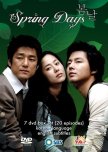
There are times, I think, when nothing beats a KDrama from the early 2000s
"Spring Day" is a love story told in a triangle. So drama in drama feels right at home here. And "Spring Day" has a lot more to offer in the proven makjang-mix to really heat up the story. If the merry-go-round isn't going straight forward, than simply because it's going backwards.Three is one too many. Being well aware of the consequences and where the story must lead towards, it is nevertheless the path that paves the series pleasure of cathartic ups and downs. You can get really upset about this and that. The rhythms of the soundtrack whip your emotions through the most varied of situations. The assorted mix of (by now long) proven actors give the protagonists their three dimensional profile. None of those characters is really grippy, smooth or edgeless, though. Whether brotherly relationship, romance or parental relationship, it´s all full of sometimes touching, sometimes pathetic ambivalences – sometimes hurting, sometimes soothing and hurting at the same time. In short, the KDrama presents quite some space for compassion and catharsis.
There are times, I think, when nothing beats a KDrama from the early 2000s. I couldn't have timed my ´Spring Day´ better (in Spring 2023). After a flood of stories about contemporary scheming, autocratic backroom politics, bullying among students and misogyny, "Spring Day" feels like an island in many ways. The world is not safe there, on the contrary. Makjang rocks the turbulence upwards. Nevertheless, there are 'only' personal destinies and family tragedies here that do not have the social impact of some current series topics. We get thrown around in an ambivalent emotional swell between 'soothing' and 'hurting'. In the end the story is told to the end. The ending may or may not please, but it has its ending. (A lot of recent KDrama with current underlying social issues tend to deep down leave a thorn after the end of the story, as the social swamp that fueled the story remains a given reality and lingers on…)
------------------------------------------------------------------------
By the way:
With "Spring Day" in 2005, Go Hyun-jung marks her comeback after a War-of-Roses divorce with a Jaebeol of the Samsung Dynasty. So in 2003 she actually had just finished her own Makjang drama personally. Eventually, she was able to free herself from the obviously tormenting clutches of her husband and his dominant, oppressive family, who (so it is said) permanently devalued her because of her humble origins, simply making use of her beauty for bearing pretty children. Yet the price for liberation was high. Above all, she had to leave her children behind and give up visitation and custody rights. Although she was able to re-establish her life somehow against all (by her husband´s family deliberately implemented) odds , she (so it is said) still is not allowed to see her children to this day.
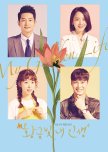
Weekend family drama, progressively challenging the concept of becoming/living as an ´adult´
“My Golden Life” is one of those KDramas that have been writing drama-history in South Korea. It is considered a 'national' series – popularity increased rapidly, the number of viewers doubled during the broadcast and towards the end, almost half of all nationwide TV audience during the weekends, while “My Golden Life” was broadcast, watched this series."My Golden Life" is a family drama, that doesn't just get lost in family clichés, Makjang and RomCom, but instead explicitly addresses some critical contemporary issues. Additionally, given attitudes and convictions are boldly deconstructed along the way. Thus, "My Golden Life" is a rather progressive family drama, involving also the 'quite new' concept of making personal life decisions despite (and in opposition to) family interests. In addition, more than one protagonist is questioning his/her life decisions or is forced to dealing with 'failure' (up to 'depression' as a result of learned helplessness), which is also quite progressive. Whether rich or poor, such issues likewise hit any income classes - in “My Golden Life”, too. In addition, there are current long-running topics such as the (lack of) work-life balance, discrimination because of social status, and the shame of divorce, as well as the increasingly sensitive issue of 'age'.
Ultimately “My Golden Life” is progressively challenging the concept of maturing in the sense of making my own, accountable decisions and thus becoming/living as an ´adult´. What does it mean, what does it need to be an 'adult'? ´Adult´ in the sense of having grown out of the familiar nest and being able to fly with my own wings? In the sense of being challenged to apply what I have learned in my own, individual manner? Is it allowed? Actually desired? Even wanted?
Notably gratifying and astonishing: Throughout the series, practically all of the divers family members go through their personal maturing processes against the background of various contemporary social issues. Many dramaturgical motifs may be familiar, but you can be sure that sooner or later everyone will be challenged with their attitudes and decisions being on trial. “My Golden Life” is not about stumbling through life with a social reptilian brain in obvious stimulus-response pattern. And it is not about by all means controlling the environment with the arrogant mindset of absolutist power fantasies. "My Golden Life" is intelligently and systematically deconstructing the usual set screws for critical life decisions (and dramaturgical plot developments.) In the end, almost every protagonist gets challenged and in the long run actually they all come to their individual, sometimes astonishingly mature, honest and even wise reassessments and re-decisions. This is (at least in this KDrama) possible, permitted, actually prerequisite.
Strikingly symbolic to deconstruction processes of social and individual assumptions throughout the story, ´gold´ is a metaphor for the estimation and valuation of an individual life. Its meaning and value is changing throughout the KDrama, parallel to the transformation processes of the protagonists... Most of the characters initially have the conviction that money (and associated with it: status) is the prerequisite or guarantee for happiness and a worthwhile, precious life... (as on the other hand the lack or loss of money is the reason or the cause of unhappiness and equivalent to a nugatory life.) However, most of them realize over the course of story that a ´golden´ life is not necessarily one that is successful, prosperous and meaningful because of a lot of money. In fact, an elitist, privileged life - being born with a ´golden spoon´ in the mouth - eventually comes with a ´golden cage´, too... Rather, a ´golden´ life is cordial, substantial and radiant with accountability and authenticity.
Within turbulent relationship dynamics (including a bit of Makjang-style topping when it comes to plot development) the 'impoverished middle class' and the 'dirty rich Jaebeol clan' are cleverly juxtaposed against each other, thus almost offensively confronting with the exaggeration of social class-affiliation and questioning traditional mindsets; additionally, full of wit contrasting submissive obedience and self-confident rebellion. Meanwhile, a dubious, arrogantly patronizing 'Noblesse oblige' virtue is craftily criticized, too.
“My Golden Life” is sometimes funny, sometimes intelligent, sometimes outrageously provocative, sometimes infuriating, sometimes emotionally serious, sometimes touching and sometimes downright grotesque. Being set as a family weekend drama, it is supposed to be easy to digest… yet, at the same time, the KDrama is consistently keeping its unabashed finger (gently, yet persistently) on the social scrapes, quirks and deep wounds, too. An astonishingly felicitous, ambitious balancing act. Overall, “My Golden Life” isn´t long-winded, even with 52 episodes. You may as well give it a try.
P.S.:
'Reassessment' seems to be the greater moral of the story.
Meaning: Traditional structures, rules, proven patterns and given orders may be all well and good. They may give orientation and set a direction in life. They provide a certain range of tools and know-how on how you can meet the challenges of life. But ultimately, in each individual case, it is still indispensable to carefully consider the appropriate application and decide for yourself what actually should be and could be accomplished. What is it, that I want? What is it, that I can do? What is it that I think is right? And what is it, that I am willing to supply?
At the end of education and apprenticeship usually there is a form of diploma or master's degree – not for mere copying, but for suitable, at best innovative application and enhancements. And in "My Golden Life" there are quite a few characters truly having earned their award... each in their own way. Eventually, it won´t do to simply adopt what others suggest, would have done or did before. It is all about individual solutions. Traditional lifestyles and attitudes are put to the test and are systematically deconstructed - voluntarily or involuntarily. In the end, the individually appropriate reassessment and authentically fitting solution does not necessarily have to lead to an easy or obvious decision...
"My Golden Life" is thus also giving a lesson in emancipation, too - in the original Latin and also in the more modern sense. Initially, Latin “emancipatio” was the “release of the son from paternal power”. In a broader sense: the child has grown or the student has been educated, so they can hold themselves accountable for their own life tasks and work obligations and thus take responsibility and reflect on their achievements accordingly. Additionally, in a modern, more general sense, emancipation is freedom from discrimination based on group, sex or class membership…
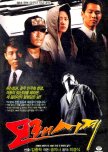
Haunting. Powerful. Taciturn. Unforgettable.
"Sandglass" is a KDrama that relentlessly, sophisticatedly and yet sensitively processes the pain of the South Korean people, that paves the path towards actual democracy. Here you can get a glimpse of a cultural phenomenon: 'Han', a collectively shared sense of painfully experienced injustice (see side note below). "Sandglass" is one of the first KDramas daring to use the medium of television for more than just entertainment. It is also one of the first who could even dare to do so. Here, recent contemporary history is critically targeted from all sides. And at the same time, it becomes a collective vigil for freedom of speech and opinion, for freedom of travel and for the rule of law that have only recently been painfully achieved."Sandglass" tells the story of three young people who were friends during the 1970s and 1980s - Park Tae-soo (Choi Min-soo), who actually would have liked to study but made a career as a thug in gangster milieu, Kang Woo-suk (Park Sang-won ), who hopes for the power of the law and thus studies law, and Yoon Hye-rin (Go Hyun-jung), sort of imprisoned within the golden, solid cage being the daughter of the most influential, officially tolerated casino king in the country, who systematically suplies the government with his money from gambling via anonymous bank accounts. Jumping back and forth in time, the fatal emotional bond between the three is unraveled against the background of social events. It is a dramaturgically conscientious reckoning with the military dictatorship, its abuse of power and its crimes against the people. Original film documents were seamlessly played in, i.e. during the staging of the Gwangju massacre. The presentation of the Samchung re-education camp was also staged as realistically as possible on the basis of original photos and documents. The second half of the story then goes through the destinies of the three protagonists in mafioso style: the gangster, the prosecutor, and the heiress to the casino king. The finale is on the one hand the moment of free election for the people (running in the background), and on the other hand the result of the personal (more or less free) choices of the three protagonists, who still share a world in which despite all recent tumult and uprising basically not much has changed...
More than half of the South Korean population watched the 1995 KDrama "Sandglass". It was praised and praised again. Hard to believe, that it is these days hardly available for streaming with subtitles, never mind as DVD. Apparently, those who have a DVD are reluctant to give it away. I can understand, after I actually saw the KDrama myself - first only in the original version without subtitles (wasn't that bad, because mostly there isn't much talk :-) ), then with a time delay also with subtitles (it was definitely helpful :-) ), and by now also knowing a little more about that historic background. "Sandglass" is truly a masterpiece. Yes, it is taciturn, thrives on the acting, on long shots and on purposefully used, deliberately reduced light. It doesn't sugarcoat anything. It wants to let it sink, each and every moment. The camera accompanies the events almost like a documentary. Without comment, sequences, events, moments in time stand side by side. The story unfolds like a suction and draws you in. The soundtrack supports this pull effect. The story takes its course, the course of which is known, i.e. is predictable: Park dictatorship / suppression of democratic aspirations under the pretext of North Korean infiltration / Chun Doo-hwan supreme military leader, commander of the security and finally new president by coup d´état / martial law, Gwangju Uprising and massacre / cleansing camps / June 1987 fight, abolition of censorship, end of military dictatorship / free elections in 1992. Amazing and grandiose that via TV series a critical review of those bloody 1980s was already possible in 1995. It's brilliant, too, how the protagonists with their very different backgrounds, values and goals are fatally interwoven and mercilessly swallowed up by historical events and social circumstances.
A fantastic K-Drama. Completely consistent. first class.
A sad story. Not funny. Not at all. You have to be able to get involved with the dramaturgically idiosyncratic, taciturn handwriting. (The mood should be right, so to speak.)
(And yes, it's an old ham when it comes to production quality. Screen format, picture and sound quality can hardly keep up with the Netflix era - a digital remastering would definitely be desirable...)
Anyone who is interested in the topic but can't get to the KDrama can grab an impression of the Gwangju massacre in "Youth of May" (2021), or a feeling for the time under military dictatorship and for the concentration camps in "Giant" (2010).
However, if you have the opportunity to see "Sandglass", I recommend that you go for it. Even without historical or socio-cultural interest, KDrama has a lot to offer in terms of impressiveness and melodrama.
------------------ HISTORICAL BACKGROUND INFORMATION -----------------------
Admittedly, being able to classify the historic events, helped for me. E.g. at the beginning there are scenes in which thugs and police bus-wise arrive at a building and disperse the opponent party´s event. This was actually the key historical point, marking the beginning of the massive social unrest, which resulted in actual free elections 13 years later. In fact, it was originally a comparatively small strike in 1979, which took place on the 4th floor of the New Democratic Party's headquarters. Around 200 women, workers at the textile company YH Trading Corporation, protested against the closure of their factory. Unions had no place during Yushin dictatorship, however his sit-in-demonstration was actually almost too minor, to interfere. Nevertheless, the government used the particular context at the opposition party building as a cover for a major anti-opposition operation - 'Operation 101'. Around 1,000 police officers in uniform and civilian gangs of thugs assaulted leading party members and 174 of the demonstrating women workers. Union leader Kim Gyeong-sook died while jumping out of the window.
The civilian thugs (fictional Tae-soo in "Sandglass" being one of them), were subordinate to the main money-provider of the regime (here the casino king and Hye-rin's father, who clean-washed his income for political means.)
That factory workers´ trade union action by no means was the reason for the following uprising. However the occasion served as the momentum for what was to come. Against this background, the later (fictive) encounter between Hye-rin and one of those women from 1979 becomes understandable. Hye-rin adores the by now torture-broken woman for her brave fight for democracy back then. That woman, however, never wanted a political revolt, she just didn't want to lose her job. In fact she feels betrayed and instrumentalized in a political fight that she really didn't want to fight and in which she lost everything, even herself, her dignity and self-respect.
Responsible for the politicization of events that had taken on a dynamic of its own, was actually the Park regime itself: it´s attempt to split and suppress the opposition. By demanding the party leader Kim Young-sam and his deputies to resign from their mandate provoked and politicized the public. Since this coincided with the beginning of the winter semester, the student movement, too, took the incidence for a red-hot political profile: demanding the end of the Park government. A corresponding demonstration in Busan was violently suppressed in this context. A few days later, president Park was assassinated by the head of the Korean Central Intelligence Agency (KCIA). This assassination had nothing to do with the students and their demands. Neither does North Korean Communism. It just coincided timewise with the Busan demonstration. The military, in turn, took advantage of the political power vacuum situation, imposed martial law on the mainland, installed a far-reaching investigative body and thus paved the way for the meteoric rise of Chun Doo-hwan, who was appointed chief investigator. He used his chance consistently and purposefully. After 8 months of military coup, the country had a new dictator in uniform who presented himself as the savior of the nation.
He repreatedly and systematically declared the pro-democracy drive the enemy by spreading conspiracy and infiltration theories about North Korea's ambitions. Press and public were massively manipulated with so-called K-operations (king´s operations) in order to convince the people by the good of military rule. The credo was: the military and Chun Doo-hwan were the only chance to counter the spreading, communist-manipulated unrest, in creating something like order and security. At the same time, the military units were drilled with the so-called Choongjung (True Heart) training for a particularly aggressive and efficient suppression of demonstrations. New paratrooper units were created as special forces. In addition to physical fitness, the training included the development of a strong corps-spirit and the use of massive violence and targeted abuse.
Against this background, the situation among the military units deployed in Gwangju in May 1980 can also become somewhat more understandable. On the one hand, they were brainwashed. On the other hand, to date it has still not really been clarified who gave the orders for the escalating violence in May 1980 - e.g. orders to shoot and the use of paratroopers. Internal ambivalence and irritation was common at all levels of command. But that didn't help. In the end the corps-spirit was more binding and prevailed. In this respect, the executing soldiers, as perpetrators, somehow became victims in those sad May days, too. The proclaimed enemy - North Korean Communism, which is behind the pro-democracy movement - and the unshakable pillar of power - the military dictatorship with all its arrogance - posed such a strong, effective, powerful threat, so that it was so frightening people in uniform (and without) and made them hitting their brothers and sisters indiscriminately (again, after barely three decades). Because someone had chosen Gwangju as the place of the example. And because the sides there had just turned out that way - those who lived in, studied in or visited Gwangju on the one hand, and those who were doing their military service at nearby barracks at the time. On the other hand, the political vision or just a simple wish, that everybody might finally live freely under fair conditions, seemed hopeless. Suddenly the fight was (rather apolitical) about pure survival and desperate rebellion against arbitrary violence.
Eventually, with "Sandglass" the South Korean population became seriously aware of what had really happened in Gwangju in 1980: a people´s uprising against military oppression, being brutally suppressed. Because of the propagandistic K-operations and the censorship (which was repealed only in 1987), knowledge of these events was never really able to spread. Numerous witnesses had deliberately been put into camps or imprisoned. For the television audience in 1995, these street-fighting scenes must have come as a complete shock, not only because they are terrifying in themselves (regardless of where and when), but because they actually had taken place in such brutal manner and in such close proximity completely without their knowledge. In this way, "Sandglass" also became the trigger for nationwide latest history processing. The TV production paved the way for more critical historical scrutiny in the media and also apparently accelerated the course of the trial and sentencing of ex-President Chun Doo-hwan in 1996. He was sentenced to death. (However, on appeal it was turned into a life sentence. His assets, of course, were safely parked, too. He died of cancer in 2021.)
---------------- Side note: --- NATIONAL SECURITY ACT ----
The National Security Law has been in force in South Korea since 1948 - until today. Its primary purpose was to push through anti-communist propaganda and to control or shut down opposing intellectuals, artists, journalists, students etc.. This National Security Act de facto restricts freedom up to this day and ultimately violates the 1948 Universal Declaration of Human Rights and the 1976 International Covenant on Civil and Political Rights, which South Korea had actually ratified. Fatally, it seamlessly continues a relic from the days unter Japanese rule. Several 100,000 people have fallen victim to this law over the past few decades. The verdicts resulted in prison sentences of thirty to forty years, which is among the longest in the world. It has served military dictatorships well, opening the door to arrest and torture countless times. Even after the end of the dictatorship, as late as 1989, obviously an average of 3.3 people each day were arrested, tortured and sentenced to prison under this national security law. To this day, the law is still officially considered constitutional...
--------------- Side note: --- RE-EDUCATION, CLEANSING AND CONCENTRATION CAMPS ---
A unique dubious institution during the Chun Doo-hwan dictatorship were the concentration camps for re-educating unwanted citizens. 25 such camps were set up in the aftermath of the Gwangju massacres. They served to systematically clear the streets of South Korea of unwanted people (and yet mostly arbitrarily as a military demonstration of power). The camps were primarily used for brutal abuse - any dignity was broken, body and soul pushed to the limit.
The detainees were divided into 4 categories: A implied prison; B and C an agonizing time in one of the re-education camps; D a warning. Category B and C inmates often ended up in prison as well, provided they survived the re-education camps. E.g. a former military prison in Yeoncheon, Gyeonggi was thus modified according to 'Samchung Plan No. 5'. This location officially was established to fight North Korean Communism: up to 100,000 innocent people may have gone through hell without a warrant - and rarely enough survived.
--------------- Side note: --- HAN ---
Han can be considered a collectively shared, identity-forming cultural pain in the sense of sad and angry grief. This cultural characteristic developed in the course of Japanese colonization of Joseon. There has been, and still is, debate about the extent to which Han can or cannot be considered a collective trait that creates identity. In any case, as a shared painful experience of that time, a specific form of expression of grief developed, while behind melancholy suppressed anger also resonates. Han has found its very unique solemn, deeply and sadly swinging aesthetic in Korean culture, which we can observe/feel in music, film, television, literature, poetry etc. It can be considered a collectively shared state of mind, that feeds on the traumatic experience of humiliation and abuse as a people that Joseon endured so massively at the hands of the Japanese oppressors. Han addresses helplessness in the face of overwhelming injustice. But despite all the pain and sadness, there is also something tough in Han: an inner resilience, a rebellion, that still provides something like strength in the darkest depths.
Han was further nurtured in the post-Joseon era by the separation of families into two antagonized nations. Finally those brutal 1980s, which are revived in "Sandglass" in the sense of a solidary vigil, tie directly to this collective Han - as a basic feeling that continuously and silently runs through (especially) the first half of the KDrama. A collective emotional state from which one cannot escape: the experience of suffering; the ability of suffering; the national destiny of suffering.
In the course of South Korean turbo-capitalism over the past two decades, Han as an issue has receded somewhat into the background among the younger generation. Nevertheless, there is already a new, modified, less beautiful form of expression: ´Hwabyeong´, the culture-specific Korean manifestation of a depressive psychosomatic disorder with characteristic symptoms, that already affects wide circles - as a result of suppressed anger in the face of overwhelming social circumstances experienced as unfair. (e.g. victims of any sort of bullying in school or at work etc.)
(I wonder, whether it would not be better to continue to give Han an explicit, contemporary, aesthetic expression - in contrast to the embellished, perfected facades e.g. in KPop + KDrama culture... but that would be another topic.. .)
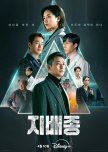
Crisp and tasty KDrama - revolving around some hot topics that one might rather want to call sci-fi
Intelligent, sharp, with strong characters. A crisp and tasty KDrama. “Blood Free” got me immediately - with an original hook, set within a gripping milieu, topped by thoughtful demeanor of interestingly authentic protagonists and splendid casting.Of course, the interfering natural interest of those in power (who obviously can never keep their hands off) is not at all surprising. Yet, the processing of some rather hot contemporary issues was presented in a refreshingly concise manner. Including topics that one might call a dream of the future... A bit far-fetched here and there? Perhaps. Nevertheless, often enough well grounded in common sense.
I assume there could as well be a second season... because the end doesn´t necessarily have to be the end, does it?
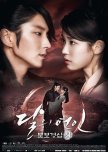
Entertaining, yet rather lightweight. Visually stunning scenes. Emotionally intense at times, too
Frankly, I'm not a fan of shallow, adolescent love stories. (Not necessarily because they are not good, but I guess I am too old by now. The topics are not mine anymore.) I'm interested in somewhat more complex, mature characters and differentiated relationship studies - preferably in an distinctive (Korean) context with additional historical, cultural or subcultural insight."Moon Lovers - Scarlet Heart Ryeo" originally goes back to a Chinese story. The movie adaptation was a great success and so here comes a Korean remake - the plot is unceremoniously moved to the Goryeo of the 12th century and a controversial historical ruler is portrayed on that occasion: the 4th son of the founder of the Wang dynasty (who ruled the Goryeo Empire for over 400 years) King Gwangjong, born under the name Wang So (925-975).
----------------------- SIDE NOTE --- King Gwangjong
Some historical sources have led to the interpretation that he was a right-wing tyrant, but more recent evidence suggests that he implemented the major reforms that laid the foundation for a solid kingdom for more than 4 centuries. This character has also appeared several times in KDrama, for example in "Taejo Wanggun" (2000), "The Dawn of the Empire" (2002), "Empress Chunchu" (2009), "Shine or Go Crazy" (2015) or here: "Moon Lovers - Scarlet Heart Ryeo" (2016).
Wang So had three older brothers (Wang Mu, Wang Tae, Wang Yo), 20 half brothers and 7 half sisters. From this, one can firstly see that he was not actually considered for the line of succession, and secondly suspect that King Taejo kept several wives at court. As life goes, all three older brothers died for different reasons and in the end the crown accidentally fell at Wang So's feet.
After a turbulent period of 3 kings in quick succession, King Gwangjong re-established a stable, centralized government with a strong, loyal army and 7 peaceful years before the aristocracy rebelled against his reforms (which came at their expense). One of his innovative reforms concerned slave ownership, which he had officially checked for legality. When in doubt, the slaves became free people and taxpayers (while their former masters began to lose influence...) However, putting down this rebellion of aristocracy earned him the reputation of a bloody tyrant.
Another reform was the introduction of a national civil service examination, which lasted for almost 950 years. This replaced the pure nepotism previously practiced in filling political offices with performance and ability. At the same time he laid the basis for Confucianism as a principle of social order. He also introduced a dress code at court, from which the respective rank could be read from the colors.
King Gwangjong married his half-sister and two nieces. This is unique in Goryeo's history, as it was more common at court to marry outside of the bloodline in order to gain allied lordships. Gwangjong, on the other hand, relied on a strong, purely royal bloodline. After all, he ruled for 26 years and set the course for the next 400 or so.
-----------------------------------------------------
Back to the KDrama. Unfortunately, the plot that was spun around this dazzling historical king and his family is a bit shallow and predictable at times. Sometimes it reminded me of a harmless, colorful teenage boarding school flirtation. (I obviously don't quite correspond to the target age group there...) But then, furthermore, the story offers unexpected depth and emotionally touching scenes, too. After all, it also comes along with some exciting and visually stunning sequences and an atmospheric soundtrack. I initially ended up there for ´actress´ IU in the first place. In fact, I discovered Lee Joon-gi (as Wang So) in this KDrama. In my eyes it is his down-to-earth charisma (and maturity?) that helps to overcome some weaknesses in the script.
An attractive dramaturgically dynamic component is the leap in time, through which the approximately 20-year-old Go Ha-jin (IU) suddenly ends up at the court of the royal Wang family - in the midst of the numerous sons and half-sons of King Teajo... As a woman from the future, she brings fresh air and a cheeky spirit into everyday palace life, which is characterized by distrust and intrigues. The various mothers are prepared to do almost anything in order to secure a royal career for their precious princes. At the same time, the modern Ha-jin in her idiosyncratic way brings the blue blood of the king's sons (some of whom are still quite pubescent) to a boil, thus providing additional competition among the boys on top of the already existing succession rivals ....
A nice, charming, entertaining, but rather lightweight KDrama-tour into Korean history.
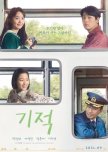
A lovingly told, soulful story based on true events. 117 uplifting minutes that´ll bring you joy
"Miracle: Letters to the President" comes across as a wonderful fairy tale. And yet it isn´t. The story arose from harsh reality. "Miracle" is a soulful KMovie about dreams come true, bathed in the bright colours of the four seasons in a remote, idyllic mountain valley. This landscape is a crucial player in its own, thus impressively contributing to the whole plot. Actually, a handkerchief or two might be helpful, even though the KMovie isn´t particularly playing on our heart strings. It's just a touching story, lovingly told.The setting of this true story: a remote mountain village in the east of the country, that can only be reached via the trass of the railway line. However, it does not have its own train station. For the residents, this means that they have to put up with an arduous walk along the trass in order to get to the next village as quickly as possible. For example, the protagonist spends five hours each day commuting to and from school. And quite a few people have already lost their lives on this dangerous walk over this busy trass through the mountains – including the mother of the protagonist. The boy's dream: a train station for his village. The chances are low, but he does not give up.
It may help that he actually seems to have a special talent for science. Also it may help that in Rah-hee, a bright daughter from an influential family, he finds a school friend and at the same time his muse, always encouraging and inspiring him in her idiosyncratic way. Thus, "Miracle" is also a tender, unusual love story with the charm of the 1980s.
So there are wounds and wonders, as well as wonderfully staged images, yet with a challenging core. All in all, a lovingly told, soulful story based on true events. Nostalgia of the 1980s, picturesque nature and rustic mountain idyll, the slower pace of provincial life and spectacular railway lines through tunnels and over bridges in the steep foothills of the Taebaek Mountains convey "Miracle" its distinctive character. The KMovie is bathed in an all-round positive aura. 117 uplifting minutes that´ll bring you joy.
-------------------------------------------------
SIDE NOTE: --- Yangwon Train Station ---
Socheon-myeon is a mountainous area in North Gyeongsan, in the east of the country.
The Korail Yeongdong Line crosses this area on its way from Yeongju in North Gyeongsang Province via Taebaek Mountain to Gangneung in Gangwon Province. Since 1988, the Yangwon railway station has been the smallest and also the first private railway station in South Korea. Until then, the village was isolated from the rest of the world in the middle of a rugged valley. Even though a railway line had passed the village since 1955, the train had never stopped. There was also no road leading to the village. 3.7 km of railway line separated the villagers from the nearest Seungbu railway station and thus connections to other towns and cities. With ax, shovel, mortar and sweat, the villagers finally built their tiny train station themselves.
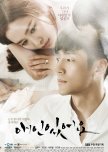
Touching, moving, stirring, rousing, exciting: Makjang, yes. And Rom+/-Com. And more. Fabulous.
Truths just want to come out. Thus, sometimes they find quite miraculous ways."I Have a Lover" features Makjang. However, the KDrama also and above all offers an unusual love story over 50 episodes.
It also tells about the creeping drama of marriage after the 'point of no return', when secrets and/or feelings of guilt, disappointment and reproaches have long barricaded the couple's way to each other and marriage has become a stale shell or facade, with hardly any space for dear affection left. Eventually, with all those hidden emotions it becomes increasingly difficult to lovingly respond to each other. At last, it may seem impossible to pave a new way towards renewed trust, closeness and genuine intimacy.
Moreover, "I Have a Lover" tells about the trauma that couples as parents suffer from the loss of their child. This KDrama is about painful emotions not being shared, getting in the way of a trusting, loving, intimate relationship. In the most desperate moments the one you need the most seems the furthest away. Missing a comforting connection makes it even worse. Finally, the insincerity leads towards sadness, anger or even indifference and detachment regarding the hollow relationship.
Drawing human characters with their shadows and radiance, the KDrama tells of the whole range of emotions people have and share in intimate relationships. "I Have a Lover" portrays an extraordinary character development process. Will the couple thus be able to reconnect?
The side plots add to the sophisticatedly composed symphony of complex, conflicting emotional worlds. It's about pain and hope, disappointment and forgiveness, sincere love and betrayal, above all about romantic love, but beyond that about love in all possible facets. Family in its ambivalence as bonding and bondage, as an ambiguous place of trust and obligation, forms a creeping leitmotif that holds all the narrative strings together.
The scenarios effortlessly switch between different living environments. The focus is also on lawyers - those 'footmen' serving the elite big corporations and those 'upright' serving the little folks.
At first, I wasn't sure if I wanted to follow an exhausting relationship between estranged spouses for 50 episodes. But it quickly became apparent that the story and its two perfectly harmonizing leads invite you to depart on a wonderfully refined emotional trek through the human emotional worlds.
"I Have a Lover" is touching, moving, stirring, rousing, exciting. It is Makjang, yes. It is Rom+/-Com, and more. Fabulous.
Ps:
The KDrama (despite the 50 episodes) suits for a rewatch, as many aspects and details might then become even more meaningful...
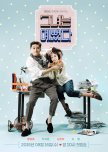
When is a woman beautiful? When is she not (anymore)? What does it mean for love? For work?
"She was Pretty" is a true story, so they say. It's about love - of course. The first love, too. And about being a woman in South Korea. When is a woman beautiful? And when is she not (anymore)? And what does that mean for her then? For love? For work? For social life? For your self-esteem?That's what this KDrama is about.
Wanting to be beautiful as a woman is widespread. Needing to be beautiful as a woman is deeply Korean. In hardly any other country do women spend so much time on skin care and make-up. Impeccability of the personality is reflected (in the South Korean self-image) in the form of pure skin and so facial care is part of a comprehensive ideal of beauty. The KBeauty industry supplies innovative products for this. In Germany, there are an average of three to five care steps that women use for their facial care. South Korea has become known for its "10-step Korean Skincare Routine", which (should) lead to a flawless porcelain complexion in lengthy and loving detail work.
In my experience, series that deal supposedly critically with ideals of beauty, bullying based on appearance, discrimination based on aesthetic value judgments and norms tend to have a hard time. They can't really be critical since their sponsors often come from the KBeauty industry... And they can rarely present an "ugly", "repulsive" character as a protagonist if they want the viewer to identify with it and actually watch the series. The subject calls for compromises before the story can even be thought through, let alone be told. Most of the time, this results in a transformation process for the protagonist: she transforms into a beauty that men and women can no longer overlook, and as a result she at last gains (now well deserved) self-esteem.
That's why I'm not a fan of this type of series. Even if the actresses are usually very committed, perhaps because the topic is so important to them. But the story can't help it... In the end, the solution is the transformation - the ugly duckling blossoms into a pretty woman and thus causes plenty of "Aha!". That doesn't convince me personally, because the core of the problem is rarely shaken, at most it is touched on the shell.
Accordingly, "She was Pretty" is not among my favorite series. Still I like it. Why? After all, there is the male character of Shin-hyuk. He's a great guy, he's good-looking, he's got what it takes - but he doesn't act like the norm. He takes a close look behind the facades and encounters the human in the woman, not the image of the woman. And falls in love with the woman as she is (before some kind of transformation). I think we need more role models like this. In "She was Pretty" at least there is one. It's encouraging and also fun to watch Shin-huyk (refreshingly played by Choi Si-won) in his encounters with the 'Ugly Duckling'.
Of course, ugly is relative in this KDrama as always. The protagonist, Kim Hye-jin, was once one of the prettiest girls in her class and totally hip. However, she has inherited her father's skin, which is characterized by a noticeable redness in the cheek area. Also, her hair is naturally frizzy. Although this might disturb the eye of the South Korean viewers, it is actually nothing that cannot be remedied with a few interventions, if a woman wanted to. Hye-jin just doesn't want to. To her it's not worth it (also in monetary terms). Yet that's how she offends people and makes social life and professional life difficult.
She compensates for her flaws (and thus her lack of value as a woman) through hard work. At the same time, she and her goodwill constantly invite others to have her be exploited. There's a memorable scene in which she takes on the new job with a competitor. Her co-worker is what you might call pretty (at least she's done a lot to be). As a reward, she is given permission to manicure her nails during working hours and to work rather slowly (if at all). Hye-jin, on the other hand, is passed around, pushed and insulted. The ideal of beauty for women - beyond performance - thus influences hierarchies in the working world. Unfortunately for South Korea this is a widespread status quo.
With Hwang Jung-eum and Choi Si-won being in a cheerful mood and providing plenty of fun in the midst of the actually less funny social conditions, the KDrama becomes worth seeing. The exalted editor-in-chief of the lifestyle magazine, who changes her hair color and her outfit with the hour and constantly recites from Italian operas, also ensures a good mood.
Ah, yes, this Kdrama is first of all a rom(ance) with some com(edy) in search of a happy ending. Some things may be predictable, but some are not.
As far as the beauty-topic ist concerned: It´s never too far from the norm, but some socially critical echoes could still be sprinkled nonchalantly throughout the course of the story. ...Humor paves the way for serious messages...
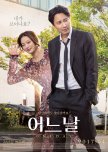
A pleasantly beneficial KMovie infusion. Quiet. Tender. Full of consolation & healing impulse
"One Day" is a beautiful KMovie. Quiet. Tender. Full of consolation and healing impulse. In addition, the story expands the usual dimensions of perception - human being sees ghost; man builds relationship with ghost. The extraordinary situation facilitates extraordinary closeness, opens up new perspectives and allows the male protagonist to look behind the obvious.The female lead character is visually impaired in life, yet specialized in sensing touch instead. The male protagonist, on the other hand, finds himself in a stage of his life, where he prefers to avoid his feelings, because they might overwhelm him. His inability to face the grief over his deceased wife, his feelings of guilt and being lost completely block him. By the way, the female protagonist is also blocked: she is in a coma.
The process of rapprochement between the two triggers a healing process, which is captured tenderly and lovingly, reaching out to the side plots, too. The KMovie knows how to touch. It might come along in an unexcited manner, yet with the perseverance of water, dealing with the stone...
After seeing the movie for the first time, I had no idea what had happened to me. It had pulled me into gentle inebriety. I had actually been sucked in and completely lost the distance.
So I couldn't write anything about it at first. I knew, l would rather want to see it again sometime in the near future. And again, it might not have been my last encounter with “One Day”. Why? Because of the overall gentle tone, the particular radiance, and the unique look&feel of this story. Because it's good.
“One Day” is not a blockbuster, no. However, in my eyes and according to my feeling, it offers a pleasantly beneficial KMovie infusion. (With wonderful acting, too.)
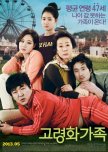
Dysfunctional family to touch. True to life. Rough. Surprisingly on a positive note though
"Boomerang Family" refers to the term 'boomerang kids': adults who for pragmatic reasons move back in with their parents - mostly for financial reasons, because of unemployment or because of divorce. The protagonists of this KMovie are the mother, her three adult children and her granddaughter. Together they form the boomerang family.In South Korea, family is the greatest good. Family is omnipresent and gets involved everywhere. This does not mean, however, that family is therefore only associated with happiness, love and warmth. On the contrary. There's a lot of pain associated with it. Much is and remains unsaid. Punches are often included as well.
That's what "Boomerang Family" is about - the dysfunctional aspects of a simple family. Strife and rivalry and fights. Envy and inferiority. Pride. Yet also moments of happiness. Eventually not being seen. Yet, being seen, too. Unspoken truths that will sooner or later be told anyway. Very private, often rough, unsightly, even downright repulsive manners in everyday interactions in the smallest of spaces, which we actually (if at all) only share in the closest, most intimate circle. E.g. in family, that takes you as you are. (Inevitably.) (Out of habit.) (Because one is just so familiar due to the proximity in time and space that one has shared.) (Out of love?)
The bottom line in "Boomerang Family" is love, which, in its most screwed up way, slumbers and lurks somewhere behind the curtain of mostly ugly, all too familiar patterns of everyday, long-established, well-established manners. Strangely enough, it is simply there.
In the world of the protagonists that curtain is rather shabby. Life is simple. The language rough. Proximity is created through shouting, scrambles and fights. Community can be experienced through shared meals, though. Those meals structure family life and become a connecting, binding medium. The common meal is the place of communication and encounter under largely regulated, peaceful conditions. Everything before and after, however, can quickly (almost certainly) get out of hand.
A special aspect for South Korean conditions, where the direct bloodline is still enormously important: Over time, it becomes clear that the protagonist family is actually a rather progressive variant of a patchwork family. Because of that fact, at first glance all seems to be in question. Nevertheless, this realization cannot erase the lived experience as a "family". The simple, unnamed, tangible, rustic, crude 'love' between siblings that is celebrated with this movie, is not in the genes, but has grown out of shared experiences. In this message lies the magic of this otherwise rather brittle, sometimes dark story. Eventually the heaviness is balanced here and there with a breeze of quite idiosyncratic humor.
Everyone in the family has their own stories and small, medium or big tragedies that bring them back together under one roof. A dysfunctional family to touch, true to life, authentic, in all obscenity. As a spectator, you are brought up close, sometimes closer than you might like. Heaviness and pessimism may want to impose themselves in the course of events, but they ultimately fail to determine the emotional space. You wouldn´t believe it, but the story ends on a consistently positive note.
The KMovie is a film adaptation of a novel. It could also be a theatrical performance. It touches, repels, shamelessly places the ugly next to moments of happiness. Who actually is to judge life? What is good? What is beautiful? What is valuable? What is happiness? Ultimately, all protagonists feel (not only, but ALSO) valuable and happy in their affiliation. So what are the criteria for evaluating the quality of life? "Boomerang Familie" chooses a very idiosyncratic, but ultimately soothing perspective - beyond lifestyle, image, aesthetics or monetary wealth.
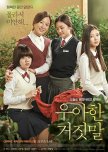
Fantastic, the (red) thread - in every respect.
I have been reading only positive critiques about “Thread of Lies” all over the place. It just took a while before I could see the KMovie for myself. Basically, all the praise has already been said. Nonetheless! The story, which is sad in itself, is told, staged and acted in just such a wonderfully clever way! Despite the seriousness of its topic, the basic attitude is positive and light. The complex and complicated underlying social and emotional mechanisms are so sensitively identified and processed, I can't help but find words of praise for "Thread of Lies" myself, too! Absolutely worth seeing! The characters, their motives and backgrounds, their conflicting feelings, the gray in the shadow, the light in the darkness, everything comes across as multidimensional authenticity.The older sister sets out to find out the actual reasons for the suicide of her younger, 14-year-old sister. We with her. There are traces – Suspicion. Culprit. Fault. Shame. As far as the eye can see... ...including the look in the mirror. Yet, it is not the index finger being raised. Rather, there is a hand, valiantly reaching out. Powerful!
It is not about accusation and blame or justification and defense. It is like it is. It was what it was. Recognizing THAT for what it is. Not sugarcoating it. No excuses. Recognizing each individual’s own contribution to some tragedy. It's all about this. To learn something out of it? In the best case!
In this KDrama, bullying (or mobbing) comes without bloody beatings and physical violence. Rather, it is the psychological, manipulative, nastily hidden, difficult-to-understand social-emotional mechanisms that are elaborated in an extremely sensitive, comprehensible way. A girl is forced into inner isolation at an age when the peer group actually becomes more important than family. Friendship, dependence, abuse - the boundaries are not yet so clear. When it comes to that, the young are still 'children' – perhaps with high ideals already, but still without lived friendship-experience. Friendship is a word with deep meaning, a powerful concept. It is related to high hopes and yearnings. It is needed, in order to survive in this world.
In contrast, there are parents who know better and still duck away. There are bullying victims who somehow survived. Also parents, who are absorbed in their own world. And in the middle of it all, a young girl says goodbye to this world. Decided and definite. Yet at the same time hesitant, too. Desperate after all. Helpless. A 14-year-old says goodbye to a world in which the only one, who knew about how she truly felt, was a stranger...
The complex story is processed in a non-linear manner. Compact and yet differentiated. The tragedy of the unspectacular is intensified by a rather subtly developed arc suspension. Touching, but not told in an overly emotional way. And what can I say... the story unfolds in such a true to life manner that you can't even be angry with the venomous perpetrator. At least not as much as you would like...
Fantastic, the (red) thread - in every respect.
PS:
The story is based on the novel “Elegant Lies” by Kim Ryeo-ryeong in 2009. Actually, the film production had a rather low budget and its initial difficulties to get started, as the topic is considered highly sensitive, especially in South Korea. The KMovie, however, gave the lie to the doubters. The response was enormous and consistently positive.
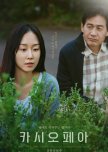
Father + daughter challenged in the face of presenile Alzheimer
Cassiopeia has already won the Korean Association of Film Critics Awards 2022.I would recommend it, too.
The KMovie Cassiopeia tackles an unpleasent subject: presenile Alzheimer's dementia. In an increasingly aging society, dementia will become more and more present and more common within the personal environment of all of us. Most cases occur at ages 65+. However, a small percentage is also affected at a younger age. This can even occur very early due to hereditary factors - as documented sensitively and unforgettable in the KMovie "A Moment to Remember". But this can also have many other causes. Dementia is a shocking diagnosis at any age, because with your eyes wide open, your own life inevitably slips away... faster than you imagine, you will no longer be able to recognize your own children, partners, friends or parents, while also the bodily functions will do their own thing.
"Cassiopeia" is about a woman in her 40s who is overwhelmed by presenile Alzheimer's dementia. However, the narration is slightly different than in "A Moment to Remember". "A Moment to Remember" captures the strong emotionality of the mental degeneration process practically from within - in touching scenes and sensitive relationship dynamics and tells the story of how memories in her head are erased as a painful loss for everyone involved. In "Cassiopeia", on the other hand, the audience follows the accumulating social moments in a comparatively objective manner, in which the exponentially progressing decay of the nerve cells is expressed - simply stating, so to speak. (Just as the protagonist initially presents herself as an objective, sober and rather sever person.) Emotionality is not dramaturgically staged in this KMovie, but results from the sum of soberly observed situations of individual loss of control and Su-jin's familiar world broken in two - one in which clarity still reigns and one in which everyone, even she herself is a stranger. From the emotionality thus involved - fear of failure, helplessness, shame, being at the mercy of others and much more - one cannot withdraw oneself. Rather, this emotionality develops an increasingly peculiar driving force (just as the protagonist's psychological/physical development process picks up speed). Eventually, the KMovie goes straight to the heart and makes people think.
In "A Moment to Remember" the focus was on the relationship dynamics with the beloved husband, here it is the portrait between daughter and father. In this case, the father tries to do better in old age what he could not do when he was younger, as he was not around.
In "A Moment to Remember" the protagonist is still at the very beginning of her young, promising life. In "Cassiopeia" Su-jin has achieved quite a lot: she is a mother, a successful lawyer, and also divorced. The daughter is about to move to her father in the USA. Significantly, the life of the protagonist, as it was up to now, ends in several respects with the departure of her daughter. It becomes difficult even for the star constellation Cassiopeia to give life perspective and orientation...
(By the way: the KMovie builds on a nice analogy between Cassiopeia and family. Both the star constellation pointing to the North Star and one's own family cannot help you, finding your path and your own way with life. Yet, we can rely on them if we got lost along the way: as some place to look out for/reach out for, regarding perspective/support).
Emotive. Especially by those often deliberatly soberly, calmly captured situations in which both the orderly and deformed worlds meet and finally merge. The helplessness and coldness of the social environment enfolds in all its unvarnished harshness - by its objective narrative style and camera perspective it is subtly thrown back at us. We are emotionally drawn into what is happening in two respects: regarding our empathy with Su-jin, which we cannot escape in the progress of the story, as well as regarding our identification with people/strangers Su-jin meets along the way - because that is what we are, too. How do WE actually deal with people who have obviously lost control of their lives or are about to lose it? Can WE stand this? Can WE lend a helping hand with this? Be of support? Even (or especially) if it's just a casual encounter on the street, an acquaintance in the neighborhood, or a colleague at work?

Radiant indeed! Honest. Real. Powerful. Intense. Soulful. As is the life of the Haenyeo.
Remarkable. Exceptional. A Shining Star in KMovieHeaven."Everglow" is radiant indeed. Honest. Real. Powerful. Told in few words only, but with wonderful pictures and profound scenes with soulful encounters. Full of love for the island, the Haenyeo, the sea, the landscape, life and love - in whatever form it chooses to show itself.
Go Doo-shim has surpassed herself many times in her long career as an actress and has set an unforgettable monument to many a female archetype. But in this life-affirming chamber piece that breathes pure nature, she surpasses herself a bit more: in the role of one of the comparatively few remaining, unique Haenyeo divers on Yejudo's coasts: Grumpy, dismissive, plain, robust, simple, strong, tireless, helpful, sensitive, profound, motherly, grandmotherly, friendly, old wise woman as well as tender, vulnerable, radiantly in love. With a great pain and a big heart - but she keeps both hidden deep inside of her. "Life makes life go on." Deeply connected and yet alone. Al(l)One with everything, while diving in the sea.
------------------------------------------------------------
The Haenyeo...
...are at home in the silence of the sea. Every day for up to 7 hours, in and under water, while holding their breath for more than 3 minutes. Breaking the surface, in stages they loudly blow out the air they are holding, while breathing in fresh oxygen, too. "Sumbisori" is the name of the peculiar whistling sound, for which each haenyeo finds its own variation. When they have deposited their prey in the net and their breathing has returned to normal, they launch again and dive back down into stillness. This is a world unto itself. Mentally focused on the now. Physically hardened by sun, wind and salt water. Depending on the time of year, tide and weather, several hours in the sea are followed by long breaks in order to warm up by the fire, together with the other haenyeo. Haeneyo is what women do. Haenyeo shapes the women of the island, makes them self-confident, independent and firmly connected in matriarchal community. After warming up, it's back into the water for several hours. It is an intense, existential, essential life in total surrender to the sea.
"Everglow" honors the life and tradition of the sea women or daughters of the sea in two respects, in that the story of the story has just such a monument and legacy as its subject: A documentary about the Haenyeo, which is to be broadcast on television.
Girl power and Haenyeo go hand in hand on Jejudo. Life on the island follows different rules and rhythms than on the mainland. Diving for valuable seafood of all kinds off the coasts of the volcanic island has traditionally been a woman's job. A lucrative one at that. The seabed is like extended farmland. The Haenyeo and its contribution to the cultural life on the island is undisputed and has even been included in the UNESCO list of intangible world heritage sites since 2016. Since 2017, the Haenyeo have also been officially recognized as an intangible cultural asset of South Korea. A culture that is dying out. Hardly any of the professional divers today are under 50, most are over 60. The technical equipment is almost the same as at the beginning of their career, which begins for most at about 8 years - with plenty of swimming and diving training in shallow water. From about 15 they are then considered "Baby Haenyeos". Experience and training are everything, because it's about nothing less than daily survival using enormous lung capacity, robust physicality for high resistance to the cold and a lot of practice in equalizing pressure. Once you are a daughter of the sea, you rarely get away from it. There is no retirement age. After bathing suits became neoprene suits, the time in the water between breaks could be significantly increased. Some swim out from shore, others take boats, and still others engage in some form of island hopping. Each has their sea farm, which they reap almost daily.
And each has a tremendous knowledge of nature, the sea, the wind and the tides. The women always work in community, take breaks in community and support each other in community. Haenyeo are environmentally conscious marine experts from the very beginning and pioneers of an emancipated life. (Significantly, Jin Ok is given the suffix or title 'Uncle' - as the eldest of her group, she is both a person of respect and, as the binding matriarchal head of the community, equal to any man who would otherwise hold this position in Confucian tradition.)
----------------- SIDE NOTE: --- Uprising 1948/49 ---
Since "Everglow" deals with the simple life of the now mostly old Haenyeos on Jejudo, the memories of the 72-year-old protagonist inevitably also touches on a lesser-known event in recent history that shook the island deeply: an uprising against an anti-communist government campaign. Between April 1948 and May 1949, the resistance cost around 30,000 people (about 10 percent of Jejudo's residents) their lives.
--------------------------------------------------------
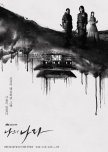
The abundance of (epic) tragedy is KDrama at its finest - meanwhile the Joseon empire is born
"My Country - The New Age" is set in the historical transition period between the Goryeo era and the Joseon era. The context is General Yi Song-gye, who for the next approximately 5 centuries tied the throne to his bloodline with a coup d'etat. However, this KDrama isn´t a history lesson as such, though historical figures get involved. Also romance is not the predominant matter. ... First and foremost it's about loyalty, unconditional male friendship and love as its basis. Secondly, it is about relationships between fathers and sons. Thirdly it is about romantic love, too. Besides and as a backbone for the storyline´s dramatic dynamics it its about political attitudes, visionary leaders and the throne. Overall, "My Country - The New Age" is definitely worth seeing, yet you should be prepared for makjang-like emotional roller coasters.The actors significantly contribute to the intensity of the story. Above all, the charisma of Jang Hyuk as Lee Bang-won (the 5th son of General Yi and later 1st Joseon King), as well as Ahn Nae-sang as the fictional Nam Jeon, whose political stances are reminiscent of the historical Jong Do-jeon (the historical Jong Do-jeon and chief chancellor, who set the political, administrative and legal course for the newly blossoming Joseon Empire.)
----------------- SIDE NOTE: --- Lee Bang-won (later King Taejong) and Jong Do-jeon (first chief chancellor of the Joseon aera) ---
These two crucial historical personalities (Lee Bang-won and Jong Do-jeon) were both driving forces in those early years of the new empire with quite lasting impact, and at their time fundamental adversaries.
Jong Do-jeon as the first Joseon King´s chief chancellor decided all matters relating to military affairs, diplomatic procedures, questions of education, new legislation and constitution (the once feudal state was now organized in a bureaucratic manner), new tax laws as well as new state religion (Buddhism became Confucianism). He ultimately moved the capital to Hanyang (now Seoul). He also named the districts of Hanyang and the 8 provinces in the country and caused many slaves to be freed. He was a man with strong visions for an innovative political system in the new kingdom - and consequently implemented those (quite unscrupulously).
His opponent was Yi Bang-won, who did not want an empire with ministers being more important than the king. Rather, he prefered a powerful monarch, a solidly grounded monarchy. He was also one of those who had contributed most to his father's successful coup d´etat. However, the latter had finally disappointed him by not choosing him as his successor. After the Queen's death, Bang-won took advantage of his father's period of mourning and invaded the palace. In doing so, he killed the state chancellor, all ministers loyal to him and the children of the deceased queen as well as the crown prince, too. So he (also) took the throne by force - his father could only abdicate and reluctantly hand over the crown. However, as King Taejong, Bang-won effectively contributed to a stable system of government in his own way. Among other things, he enacted a law allowing all citizens to register and established new Ministries: of Human Resources, Finance, Protocol, Defence, Justice and Public Affairs.
----------------------------------------------------------
With Jang Hyuk as Lee Bang-won and Ahn Nae-sang as the fictional Nam Jeon, who to a certain extent represents the ideas of Jong Do-jeon, the KDrama paints a strong picture of the crucial conflict between those political visions from the very beginning. The actors live their roles with high intensity. We get to know more about their character in their respective relationships with the two protagonists Seo Hwi, son of a once-legendary soldier of the Goryeo Empire, and Nam Sun-ho, the illegitimate son by Minister Nam Joen. Since childhood they are best friends. Then there is a twist of fate. (Here, again: two actors with splendid performance - Yang Se-jong and Woo Do-hwan.) Minister Nam Jeon alone is responsible for the twist of fate in this friendship, but Prince Bang-won becomes a free rider in this.
In short: "My Country: The New Age" offers an epic, visually stunning story with a lot of action and emotion, worth seeing sword fights (actor Jang Hyuk does the stunts all by himself), plenty of blood and even more emotion. Yes, of course there are also women and love involved ... The abundance of (epic) tragedy is KDrama at its finest.
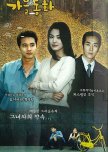
Makyang at its finest. Staged with great sensitivity. A rollercoaster ride of emotions guaranteed!
Back then, in 2000, "Autumn Tale" kicked off the celebrated "Endless Love Series" and is (like the other 3) a hit. Timeless. Heartbreaking in the face of life's unfairness. Bittersweet and tragic. "Autumn Tale" offers makjang at its finest. All of this is staged with great sensitivity. A rollercoaster ride of emotions guaranteed!Two siblings who aren't actually siblings - but nobody knows. A momentous decision when it comes out randomly. Outrageously mean intrigues. And an unshakable bond of love that (nevertheless) must not be. Because even if you might dare to rebel against the family, there is always another stroke of fate.
It is always possible for things to turn out worse - this is a promise, KDrama Land can surely give!"Autumn Tale" is prove of that. And as always with makjang: an enormous capacity for sympathy, suffering and compassion is a prerequisite for 'enjoying' this KDrama. Makjang could be considered a reinvention and revival of the idea of catharsis in connection with the Greek tragedy. On the roller coaster of human feelings between greed, love, betrayal, hate and forgiveness and suffering, scolding, laughing, crying, the moment of empathizing with the emotional processes of the protagonists can have a liberating effect. (All 4 KDramas of the "Endless Love Series" - "Winter Sonata", "Summer Scent" and "Spring Waltz", too - are actually great at ´that´. You better be prepared and ready for it... if you are, you won´t be disappointed!


 9
9 37
37 15
15



















